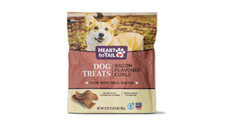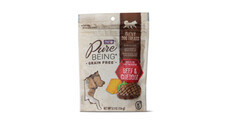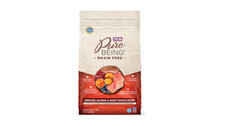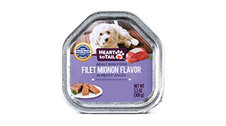Aldi Dog Food offers budget-friendly choices for pet owners. At larosafoods.com, we understand the importance of providing nutritious and delicious options for your furry friend without breaking the bank; that’s why we’re exploring Aldi’s dog food selections, highlighting their key ingredients, nutritional value, and customer feedback to help you make an informed decision for your dog’s diet, with affordable pet food, quality ingredients and balanced nutrition.
1. What Types of Aldi Dog Food Are Available?
Aldi offers a variety of dog food options to cater to different needs and preferences. These options include dry dog food, wet dog food, and dog treats.
- Dry Dog Food: This is a popular choice due to its convenience and cost-effectiveness. Aldi’s dry dog food comes in various formulas, such as complete nutrition and grain-free options.
- Wet Dog Food: Wet food can be a palatable option, especially for picky eaters or dogs with dental issues. Aldi offers wet dog food in different flavors and formulations.
- Dog Treats: Treats are great for training and rewarding your dog. Aldi provides a range of treats, including dental sticks, biscuits, and jerky.
2. What are the Key Ingredients in Aldi Dog Food?
The ingredients in Aldi dog food vary depending on the specific product, but some common ingredients include:
- Protein Sources: Chicken, beef, salmon, and turkey are often used as protein sources.
- Grains: Corn, wheat, and rice are common grains found in some formulas.
- Vegetables: Peas, carrots, and sweet potatoes may be included for added nutrients.
- Vitamins and Minerals: Essential vitamins and minerals are added to ensure a balanced diet.
It’s essential to check the ingredient list on the packaging to ensure the food meets your dog’s specific dietary needs and to avoid any potential allergens or ingredients you prefer to avoid.
3. What are the Nutritional Benefits of Aldi Dog Food?
Aldi dog food is formulated to provide essential nutrients for your dog’s overall health and well-being. Some key nutritional benefits include:
- Protein: Supports muscle development and maintenance.
- Carbohydrates: Provide energy for daily activities.
- Fats: Essential for healthy skin and coat.
- Vitamins and Minerals: Support immune function and overall health.
The nutritional content can vary between different Aldi dog food products, so it’s crucial to choose a formula that aligns with your dog’s age, breed, and activity level.
4. How Does Heart to Tail Dog Food Compare to Other Brands?
Heart to Tail is Aldi’s in-house brand for dog food and treats. When comparing it to other brands, consider the following:
- Price: Heart to Tail is generally more affordable than many well-known brands.
- Ingredients: While Heart to Tail offers decent nutrition, some premium brands may use higher-quality or more novel ingredients.
- Formulation: Heart to Tail provides basic nutritional needs, but specialized formulas (e.g., for sensitive stomachs or weight management) might be found in other brands.
Many pet owners find Heart to Tail to be a suitable option for everyday feeding, especially if budget is a concern. However, for dogs with specific dietary needs or health issues, consulting with a veterinarian and considering premium brands may be necessary.
5. Is Pure Being Dog Food a Good Choice for My Dog?
Pure Being is another Aldi brand that offers premium dog food options, often focusing on grain-free and natural ingredients. Here’s what makes it a noteworthy choice:
- Grain-Free Formulas: Ideal for dogs with grain sensitivities or allergies.
- Quality Ingredients: Often includes real meat, vegetables, and fruits.
- Nutritional Balance: Formulated to meet the nutritional levels established by the AAFCO Dog Food Nutrient Profiles for all life stages.
Pure Being dog food can be a good option if you’re looking for higher-quality ingredients and grain-free choices without the premium price tag of specialized pet stores. Always check the ingredient list to ensure it aligns with your dog’s specific dietary needs.
6. How to Choose the Right Aldi Dog Food for Your Dog’s Needs?
Alt text: Heart to Tail Complete Nutrition Dry Dog Food bag displayed, showing a balanced diet for dogs.
Selecting the right dog food involves several considerations to ensure your pet’s health and happiness.
- Age and Life Stage: Puppies, adult dogs, and senior dogs have different nutritional requirements. Choose a formula that matches your dog’s life stage.
- Breed Size: Large and small breeds may benefit from different kibble sizes and nutrient ratios.
- Activity Level: Active dogs need more calories and protein than sedentary dogs.
- Health Conditions: If your dog has allergies, sensitivities, or health issues, choose a food that addresses those specific needs.
- Ingredients: Look for high-quality protein sources, whole grains or grain-free options, and avoid artificial additives.
7. What are the Potential Downsides of Aldi Dog Food?
While Aldi dog food offers affordability and convenience, there are potential downsides to consider:
- Ingredient Quality: Compared to premium brands, Aldi’s dog food may use less expensive ingredients, which might not be as easily digestible for some dogs.
- Limited Variety: Aldi’s selection is smaller than that of dedicated pet stores, which may limit options for dogs with specific dietary needs.
- Allergen Concerns: Some formulas may contain common allergens like corn, wheat, and soy, which can be problematic for sensitive dogs.
It’s always a good idea to monitor your dog’s reaction to any new food and consult with a vet if you have concerns.
8. What Do Customers Say About Aldi Dog Food?
Customer reviews on Aldi dog food are mixed, with many praising the affordability and decent quality for the price. Common feedback includes:
- Positive:
- Affordable and budget-friendly
- Dogs seem to enjoy the taste
- Suitable for everyday feeding
- Negative:
- Some dogs experience digestive issues
- Concerns about ingredient quality compared to premium brands
- Limited selection
Reading reviews can provide valuable insights, but remember that every dog is different, and what works for one may not work for another.
9. Can Aldi Dog Food Help Manage My Dog’s Weight?
Aldi offers dog food options that can assist in weight management. Look for formulas labeled as “weight management” or “light,” which typically have:
- Lower Calorie Content: Helps reduce overall calorie intake.
- Higher Fiber Content: Promotes satiety and helps your dog feel full.
- Balanced Nutrition: Ensures your dog still receives essential nutrients while losing weight.
It’s important to follow the feeding guidelines on the packaging and adjust portions as needed, based on your dog’s individual needs and activity level. Regular exercise is also crucial for weight management.
10. Are There Any Grain-Free Aldi Dog Food Options?
Yes, Aldi offers grain-free dog food options under its Pure Being brand. Grain-free formulas are designed for dogs with grain sensitivities or allergies and typically replace grains with alternative carbohydrates like:
- Sweet potatoes
- Peas
- Lentils
Grain-free dog food can be a good choice if your dog experiences digestive issues or skin problems related to grain consumption. However, it’s essential to ensure the formula is still nutritionally balanced and meets your dog’s overall dietary needs.
11. What are the Best Aldi Dog Treats for Dental Health?
Alt text: Display of Heart to Tail Assorted Dental Sticks, highlighting their role in canine dental care.
Aldi offers several dog treats that can promote dental health. Look for options like:
- Dental Sticks: Designed to help clean teeth and freshen breath as your dog chews.
- Chew Bones: Provide a chewing action that can reduce plaque and tartar buildup.
- Hard Biscuits: The crunchy texture can help scrape away debris from teeth.
The Heart to Tail Assorted Dental Sticks and Chew Bones are popular choices. Always supervise your dog while they enjoy treats and ensure they are an appropriate size to prevent choking hazards.
12. How Does Aldi Dog Food Address Allergies and Sensitivities?
Aldi provides some options for dogs with allergies and sensitivities, particularly within its Pure Being line. Here are key considerations:
- Grain-Free Formulas: As mentioned, these avoid common grain allergens like corn, wheat, and soy.
- Limited Ingredient Diets (LID): While Aldi doesn’t specifically market LID formulas, choosing grain-free options with simpler ingredient lists can help identify and avoid allergens.
- Careful Label Reading: Always check the ingredient list for potential allergens, such as artificial colors, flavors, and preservatives.
If your dog has severe allergies, consult with a veterinarian for a prescription diet that meets their specific needs.
13. Can I Find Organic Dog Food at Aldi?
Currently, Aldi does not offer certified organic dog food options. While their Pure Being line emphasizes natural ingredients, it does not carry an organic certification. If organic dog food is a priority, you may need to explore options at specialty pet stores or online retailers.
14. How Does Aldi Dog Food Support Senior Dogs?
To support senior dogs, Aldi offers dog food options that cater to the specific needs of older canines. These formulas typically include:
- Lower Calorie Content: To help manage weight as metabolism slows down.
- Joint Support: Added glucosamine and chondroitin to support joint health.
- Easily Digestible Ingredients: To accommodate sensitive digestive systems.
- Essential Nutrients: Balanced vitamins and minerals for overall health.
Always transition your senior dog to a new food gradually and monitor their reaction to ensure they are tolerating it well.
15. Is Aldi Dog Food Suitable for Puppies?
Yes, Aldi offers dog food that is suitable for puppies. It is important to choose a formula specifically labeled for puppies or “all life stages” to ensure it meets their higher nutritional needs. Puppy-specific formulas typically have:
- Higher Protein Content: To support muscle growth and development.
- Balanced Calcium and Phosphorus: For healthy bone and teeth development.
- Essential Fatty Acids: For brain and vision development.
Follow the feeding guidelines on the packaging and adjust portions as your puppy grows.
16. What is the Price Range for Aldi Dog Food?
Aldi dog food is known for its affordability. The price range typically falls between:
- Dry Dog Food: $0.50 to $1.00 per pound
- Wet Dog Food: $0.75 to $1.50 per can
- Dog Treats: $2.00 to $5.00 per bag
Prices can vary depending on the specific product and store location. Aldi’s competitive pricing makes it a budget-friendly option for many pet owners.
17. How Does Aldi Ensure the Quality of Its Dog Food?
Aldi ensures the quality of its dog food through several measures:
- Supplier Standards: They work with trusted suppliers who meet quality and safety standards.
- Regular Testing: Products undergo regular testing to ensure they meet nutritional requirements and are free from contaminants.
- AAFCO Compliance: Aldi dog food is formulated to meet the nutritional levels established by the Association of American Feed Control Officials (AAFCO) Dog Food Nutrient Profiles.
While Aldi maintains quality standards, it’s always wise to stay informed and monitor your dog’s health and well-being.
18. Can I Mix Aldi Dog Food with Other Brands?
Mixing Aldi dog food with other brands is generally safe, but it’s essential to do it gradually to avoid digestive upset. Start by mixing a small amount of the new food with the old food and gradually increase the proportion over several days.
Ensure that both foods are nutritionally balanced and appropriate for your dog’s life stage and health needs. Mixing different brands can provide variety, but it’s crucial to monitor your dog’s reaction.
19. Where Can I Buy Aldi Dog Food?
Aldi dog food is exclusively available at Aldi stores. You can find it in the pet food aisle alongside other pet supplies. Aldi stores are located throughout the United States. To find the nearest location, visit the Aldi website or use their store locator tool.
20. What are the Benefits of Shopping for Dog Food at Aldi?
Shopping for dog food at Aldi offers several benefits:
- Affordability: Aldi provides budget-friendly options without compromising essential nutrition.
- Convenience: With numerous store locations, it’s easy to find Aldi dog food.
- Variety: Aldi offers a range of options, including dry food, wet food, and treats, to cater to different preferences.
- Quality Assurance: Aldi maintains quality standards to ensure their dog food meets nutritional requirements.
21. How Does Aldi Dog Food Compare in Terms of Ingredients to Premium Brands?
Alt text: Packaged Pure Being Grain-Free Dog Treats in Chicken flavor, highlighting natural ingredients.
When comparing Aldi dog food to premium brands in terms of ingredients, here’s a detailed breakdown:
| Feature | Aldi Dog Food (Heart to Tail, Pure Being) | Premium Dog Food Brands (e.g., Blue Buffalo, Orijen) |
|---|---|---|
| Protein Source | Typically uses common protein sources like chicken, beef, and salmon. May include meat meals. | Often features high-quality, named protein sources (e.g., deboned chicken, wild-caught salmon). May include novel proteins for sensitive dogs (e.g., venison, duck). |
| Carbohydrates | May contain grains like corn, wheat, and rice in some formulas. Pure Being offers grain-free options with sweet potatoes and peas. | Often uses alternative carbohydrates like sweet potatoes, lentils, and chickpeas. Grain-free options are common and may emphasize low-glycemic ingredients. |
| Fats | Uses common fat sources like poultry fat and soybean oil. | Emphasizes healthy fat sources like fish oil (rich in omega-3 fatty acids), flaxseed, and sunflower oil. |
| Vitamins & Minerals | Fortified with essential vitamins and minerals to meet AAFCO standards. | Includes added vitamins and minerals, often with a focus on antioxidants and supplements like glucosamine and chondroitin for joint health. |
| Additives | May contain artificial colors, flavors, and preservatives in some formulas. | Generally avoids artificial additives, colors, flavors, and preservatives. Emphasizes natural ingredients. |
| Price | More affordable, typically ranging from $0.50 to $1.00 per pound for dry food. | More expensive, often ranging from $2.00 to $4.00 per pound for dry food. |
| Overall Quality | Offers decent nutrition at a budget-friendly price. Suitable for everyday feeding for many dogs. | Focuses on high-quality ingredients and specialized formulas for specific dietary needs and health conditions. May be more suitable for dogs with allergies, sensitivities, or high-performance needs. |




22. What Types of Meat Are Typically Used in Aldi Dog Food?
Aldi dog food typically uses common meat sources.
- Chicken: A widely used and easily digestible protein source.
- Beef: Provides a rich source of protein and flavor.
- Salmon: Offers omega-3 fatty acids for skin and coat health.
- Turkey: A leaner protein option that can be suitable for dogs with sensitivities.
23. What is the Shelf Life of Aldi Dog Food?
The shelf life of Aldi dog food varies depending on the product type:
- Dry Dog Food: Typically has a shelf life of 12-18 months from the date of manufacture.
- Wet Dog Food: Generally has a shelf life of 2-3 years.
- Dog Treats: Can last from 6 months to 2 years, depending on the ingredients and packaging.
Always check the “best by” or “expiration” date on the packaging and store the food in a cool, dry place to maintain its quality and freshness.
24. Does Aldi Offer Dog Food Specifically for Weight Gain or Muscle Building?
Aldi primarily offers dog food focused on maintenance, weight management, and general health. They do not typically offer specific formulas marketed for weight gain or muscle building.
If your dog needs to gain weight or build muscle, consider the following:
- Higher Protein Content: Choose a formula with a higher percentage of protein.
- Increased Calorie Intake: Feed your dog slightly larger portions or more frequent meals.
- Consult with a Vet: A veterinarian can recommend specific dietary strategies and supplements to help your dog gain weight or build muscle safely.
25. How Can I Transition My Dog to Aldi Dog Food?
Transitioning your dog to Aldi dog food gradually is important to avoid digestive upset. Follow these steps:
- Day 1-2: Mix 25% of the new food (Aldi dog food) with 75% of the old food.
- Day 3-4: Mix 50% of the new food with 50% of the old food.
- Day 5-6: Mix 75% of the new food with 25% of the old food.
- Day 7: Feed 100% of the new food.
Monitor your dog’s stool and overall health during the transition. If you notice any signs of digestive issues, slow down the transition or consult with a vet.
26. What Additives Should I Avoid in Aldi Dog Food?
When choosing Aldi dog food, it’s wise to be mindful of certain additives that may not be beneficial for your dog’s health. Here are some additives to consider avoiding:
- Artificial Colors (e.g., Red 40, Yellow 5, Blue 2): These offer no nutritional value and have been linked to hyperactivity and allergic reactions in some dogs.
- Artificial Flavors: Can mask the true quality of ingredients and may cause sensitivities in certain dogs.
- Artificial Preservatives (e.g., BHA, BHT, Ethoxyquin): These synthetic preservatives have been associated with potential health risks. Opt for foods preserved with natural alternatives like Vitamin E (tocopherols) and Vitamin C (ascorbic acid).
- Excessive Fillers (e.g., Corn, Wheat, Soy): While not always harmful, these ingredients can be difficult for some dogs to digest and offer limited nutritional value compared to whole foods.
- Meat By-Products (Unspecified): These can be of lower quality than named meat sources. If by-products are listed, ensure they are from a named animal source.
Carefully reading the ingredient list will help you make an informed decision and select a healthier option for your canine companion.
27. Is Aldi Dog Food Ethically Sourced?
Aldi is increasingly focused on ethical sourcing, though specific details about the sourcing of their dog food ingredients are not always readily available. Here are some general points to consider:
- Supplier Standards: Aldi works with suppliers who meet certain quality and safety standards.
- Sustainability Initiatives: Aldi has sustainability initiatives aimed at reducing their environmental impact.
- Transparency: For specific information on the ethical sourcing of ingredients in Aldi dog food, it’s best to contact Aldi’s customer service directly or check their corporate responsibility reports.
28. How Does the AAFCO Impact Aldi Dog Food?
Alt text: Packaging of Pure Being Premium Dog Food featuring Chicken & Rice and Salmon & Potato flavors, displaying the balanced ingredients.
The Association of American Feed Control Officials (AAFCO) plays a significant role in the formulation and labeling of Aldi dog food. AAFCO is a voluntary membership association that sets nutritional standards for pet food in the United States. Here’s how AAFCO impacts Aldi dog food:
- Nutritional Adequacy: Aldi dog food is formulated to meet the nutritional levels established by AAFCO Dog Food Nutrient Profiles for different life stages (e.g., growth, maintenance, all life stages). This ensures that the food provides a balanced and complete diet for your dog.
- Ingredient Definitions: AAFCO provides definitions for pet food ingredients, helping to ensure consistency and transparency in labeling.
- Labeling Requirements: AAFCO sets guidelines for pet food labeling, including requirements for ingredient lists, guaranteed analysis, and feeding directions. Aldi dog food labels must comply with these regulations.
- Feeding Trials or Formulation: To claim that a dog food is “complete and balanced,” manufacturers must either conduct feeding trials according to AAFCO protocols or formulate the food to meet AAFCO nutrient profiles.
29. How Can I Find Out About Aldi Dog Food Recalls?
Staying informed about potential recalls of Aldi dog food is crucial for your pet’s safety. Here are reliable ways to find out about recalls:
- FDA Website: The U.S. Food and Drug Administration (FDA) announces pet food recalls on its website.
- Aldi Website: Check the Aldi website for recall announcements.
- Pet Food Industry Websites: Websites like Petful and Dog Food Advisor often report on pet food recalls.
- Veterinarian Alerts: Your veterinarian may notify you of recalls, especially if your dog has specific dietary needs.
- Sign Up for Email Alerts: Some organizations offer email alerts for pet food recalls.
If you suspect that your dog food has been recalled, stop feeding it immediately and contact Aldi or your veterinarian for guidance.
30. What Are the Best Ways to Store Aldi Dog Food to Maintain Freshness?
Proper storage is essential to maintain the freshness and nutritional value of Aldi dog food. Here are some best practices:
- Original Packaging: If possible, keep the food in its original packaging, as it is designed to protect against moisture and air.
- Airtight Container: Transfer the food to an airtight container made of food-grade plastic or stainless steel.
- Cool, Dry Place: Store the food in a cool, dry place away from direct sunlight, heat, and humidity.
- Avoid Temperature Fluctuations: Keep the food in a stable environment to prevent spoilage.
- Use Within a Reasonable Time: Once opened, use dry dog food within 4-6 weeks to ensure optimal freshness.
- Clean Storage Containers: Regularly clean storage containers to prevent the buildup of bacteria and pests.
- Elevate Food: Place food on pallets or shelving units, rather than directly on the floor.
31. Does Aldi Offer Dog Food for Specific Breeds?
Aldi primarily offers dog food formulated for different life stages (puppy, adult, senior) and general health needs, rather than specific breeds. Large and small breeds often have different nutritional needs, particularly regarding kibble size and nutrient ratios.
- Kibble Size: Smaller breeds may prefer smaller kibble sizes, while larger breeds may benefit from larger kibble to promote chewing and prevent gulping.
- Nutrient Ratios: Large-breed puppies require carefully balanced calcium and phosphorus levels to support healthy bone growth and prevent developmental problems.
If you have a specific breed with unique nutritional requirements, consider consulting with a veterinarian or a canine nutritionist for personalized recommendations.
32. What are Common Signs My Dog Is Not Tolerating Aldi Dog Food Well?
If your dog is not tolerating Aldi dog food well, they may exhibit several signs. Monitoring your dog closely after transitioning to a new food is essential. Common symptoms of intolerance include:
- Digestive Issues:
- Diarrhea: Loose or watery stools.
- Vomiting: Throwing up food shortly after eating or at other times.
- Flatulence: Excessive gas.
- Changes in Appetite: Refusing to eat or showing decreased interest in food.
- Skin Problems:
- Itching: Excessive scratching, licking, or biting at the skin.
- Skin Rashes: Red, inflamed, or irritated skin.
- Hair Loss: Thinning hair or bald patches.
- Other Symptoms:
- Lethargy: Decreased energy levels or fatigue.
- Weight Loss: Unexplained weight loss despite eating.
- Changes in Stool: Stools that are unusually large, poorly formed, or contain mucus.
If you observe any of these signs, discontinue feeding the Aldi dog food and consult with your veterinarian. They can help determine the underlying cause and recommend an appropriate diet for your dog.
33. Are There Any Online Resources to Learn More About Aldi Dog Food?
Finding comprehensive online resources specifically dedicated to Aldi dog food can be limited, as Aldi primarily sells its products in-store. However, here are some avenues to explore for more information:
- Aldi Official Website: Check the official Aldi website for product details, ingredient lists, and any available nutritional information.
- Customer Reviews: Look for customer reviews on third-party websites or forums where pet owners discuss their experiences with Aldi dog food.
- Pet Food Review Websites: Some pet food review websites may include reviews or analyses of Aldi dog food products.
- Social Media Groups: Join pet-related social media groups or forums where members may share their experiences and insights about Aldi dog food.
- Contact Aldi Directly: Reach out to Aldi’s customer service department for specific inquiries about their dog food products, sourcing, and quality control measures.
- Veterinarian Consultation: Discuss your dog’s dietary needs and concerns with your veterinarian, who can provide professional guidance and recommendations.
34. How to Compare Aldi Dog Food Labels with Other Brands?
Comparing Aldi dog food labels with other brands involves carefully examining key components to make an informed decision about your dog’s nutrition. Here’s a step-by-step guide:
- Ingredient List:
- First Ingredients: The ingredients are listed in descending order by weight. Look for named meat sources (e.g., chicken, beef, salmon) as the first few ingredients, as this indicates a higher protein content.
- Quality of Ingredients: Assess the quality of the ingredients. Are they whole foods, or are they processed or by-products?
- Fillers: Note the presence of fillers like corn, wheat, and soy, which offer limited nutritional value for some dogs.
- Guaranteed Analysis:
- Protein: Check the crude protein percentage. Puppies and active dogs need higher protein levels.
- Fat: Assess the crude fat percentage. Fat is essential for energy and healthy skin and coat.
- Fiber: Look at the crude fiber percentage. Fiber aids in digestion.
- Moisture: Note the moisture content, as this affects the dry matter content of the food.
- AAFCO Statement:
- Nutritional Adequacy: Look for the AAFCO statement confirming that the food is “complete and balanced” for a specific life stage (e.g., growth, maintenance, all life stages).
- Additives and Preservatives:
- Artificial Additives: Check for artificial colors, flavors, and preservatives, which are best avoided.
- Natural Preservatives: Look for natural preservatives like Vitamin E (tocopherols) and Vitamin C (ascorbic acid).
- Specific Concerns:
- Allergens: If your dog has allergies, carefully check the label for potential allergens like corn, wheat, soy, or specific proteins.
- Special Needs: If your dog has specific health needs (e.g., weight management, joint support), look for formulas that address these concerns.
35. What Are Some Budget-Friendly Alternatives to Aldi Dog Food?
If Aldi dog food doesn’t meet your needs or preferences, several other budget-friendly alternatives are available. Here are a few options to consider:
- Walmart’s “Ol’ Roy” and “Pure Balance” Brands: These offer affordable options with varying ingredient quality and formulations.
- Kroger’s “Pet Pride” Brand: Available at Kroger stores, this brand provides budget-friendly dog food options.
- Target’s “Kibbles ‘n Bits” and “Beneful” Brands: These widely available brands offer affordable choices with different flavors and formulations.
- Costco’s “Kirkland Signature” Brand: Available to Costco members, this brand offers high-quality dog food at competitive prices.
- Tractor Supply Co.’s “4health” Brand: This brand focuses on quality ingredients at an affordable price point, often featuring grain-free options.
Remember to carefully compare ingredient lists and nutritional information to ensure the alternative dog food meets your dog’s specific needs and dietary requirements.
36. Are There Any Potential Interactions Between Aldi Dog Food and Medications?
Generally, Aldi dog food is not expected to interact negatively with most common medications. However, certain ingredients or formulations could potentially affect specific medications. Here’s what to consider:
- High Fiber Content: Some weight management or high-fiber formulas might affect the absorption of certain medications.
- Vitamin and Mineral Levels: High levels of certain vitamins or minerals could interact with specific medications.
- Allergens: If your dog is taking medication to manage allergies, ensure the Aldi dog food does not contain those allergens.
Always consult with your veterinarian if your dog is taking medication and you are considering changing their diet. Your vet can provide guidance on potential interactions and help you choose a dog food that is safe and appropriate for your dog’s health needs.
37. Is It Safe to Feed My Dog Exclusively Aldi Dog Food?
Whether it is safe to feed your dog exclusively Aldi dog food depends on several factors, including the specific product, your dog’s individual needs, and overall health. Here are some key considerations:
- AAFCO Compliance: Ensure that the Aldi dog food you choose is labeled as “complete and balanced” by AAFCO for your dog’s life stage (puppy, adult, senior). This indicates that the food meets the minimum nutritional requirements established by AAFCO.
- Ingredient Quality: Assess the ingredient list to ensure it contains high-quality protein sources, healthy fats, and essential vitamins and minerals.
- Individual Needs: Consider your dog’s age, breed, activity level, and health status. Some dogs may thrive on Aldi dog food, while others may require a specialized diet.
- Monitoring: Monitor your dog’s health and well-being closely after transitioning to Aldi dog food. Look for any signs of digestive issues, skin problems, or other adverse reactions.
38. What Resources Can I Use to Learn More About Dog Nutrition?
Alt text: Display of Heart to Tail Dog Entrees showcasing various flavors.
Learning more about dog nutrition is essential for providing the best care for your furry friend. Here are some valuable resources to help you become more informed:
- Veterinarians:
- Your veterinarian is a primary source of information on dog nutrition. They can provide personalized recommendations based on your dog’s individual needs and health status.
- Board-Certified Veterinary Nutritionists:
- These specialists have advanced training in animal nutrition and can provide expert guidance on formulating diets and managing nutritional problems.
- University Veterinary Teaching Hospitals:
- Many university veterinary teaching hospitals have nutrition services that offer consultations and educational resources.
- American College of Veterinary Nutrition (ACVN):
- The ACVN website provides information on board-certified veterinary nutritionists and resources on dog nutrition.
- Pet Food Industry Websites:
- Websites like the Pet Food Institute (PFI) offer educational resources on pet food manufacturing and nutrition.
- Books on Dog Nutrition:
- “Small Animal Clinical Nutrition” is a comprehensive textbook used in veterinary schools.
- Online Courses:
- Some universities and organizations offer online courses on animal nutrition.
By utilizing these resources, you can gain a deeper understanding of dog nutrition and make informed decisions about your dog’s diet.
Visit larosafoods.com for a wealth of information on pet nutrition, healthy recipes, and expert advice to help you provide the best care for your furry friend. Whether you’re looking for balanced meal plans, guidance on choosing the right ingredients, or tips for addressing specific dietary needs, larosafoods.com is your go-to resource for all things related to dog food and nutrition. Address: 1 S Park St, San Francisco, CA 94107, United States. Phone: +1 (415) 987-0123.



